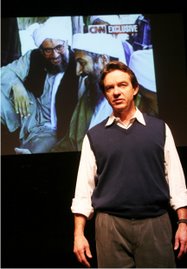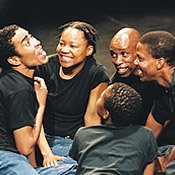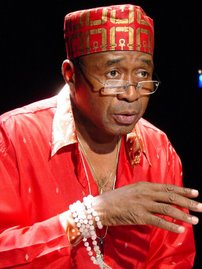One wonders: Has Mr. White seen Old Boy? Does he like it?
Old Boy is certainly better written than School Of Rock, no offense to that fine work of moral certitude, but I haven't seen Year Of The Dog (which is about the death of a dog and obviously inspired my cat to run away last night), making any criticism of the author's own screen-endeavors premature.
I have a question for Mr. White, should you, sir, ever read this: I know the mutants in The Hills Have Eyes II inspired me to brush my teeth and eat granola yesterday morning, but did Ghostbusters II inspire me to order a chai tea latte instead of a house coffee this afternoon?
I was thinking Ghostbusters II has inspired me to many acts of madness and malice over the years, and you, sir, seem to have an uncanny finger on the pulse of which movies do what, exactly, for society.
Perhaps I languish in a world of ignorance, but I don't think Old Boy is to blame for anything except a good fucking time.
Decide for yourself:
May 2, 2007
"Making a Killing"
By MIKE WHITE
Los Angeles
THE first movie I ever made was called “Death Creek Camp.” It told the age-old story of a group of teenage guys who set out on a fun-filled wilderness excursion only to be stalked and murdered by a psychopath disguised in a hockey mask and a blue kimono. It was no masterpiece of cinema.
Most of the scenes played out the same way — one of the fresh-faced hikers would get separated from the group. He would hear a noise in the bushes. “Bob? Jerry, is that you? Charlie?” Suddenly, from behind a tree, the stalker would pounce and blood would fly.
Why the killer wore a blue kimono was never explained nor why he wanted these nice campers dead. He was a deranged monster and that’s what monsters do. As the filmmaker, I was more interested in how the ketchup would drip off the victim’s cheek and where to plunge the retractable knife. I was 12.
The inspirations for this home movie (and the centerpieces of many Saturday night sleepovers) were slasher films like “Friday the 13th,” “Halloween” and “Terror Train.” My friends and I would eat junk food, drink soda and watch these cinematic bloodbaths until we dozed off, visions of gore and mayhem dancing in our heads.
Even though we all came from religious families — my father was a minister — it was rarely questioned whether our adolescent minds should be exposed to this kind of gruesome material. And clearly, we were the intended audience. My parents never sat and watched, nor did my sister, for that matter. The movies were titillating, shocking and dumb — and we teenage boys thought they were so cool. We devoured them and they, in turn, juiced us up.
After the horrific events at Virginia Tech, the relationship between violence in our movies and violence in our realities is being examined once again. Was Seung-Hui Cho inspired by a movie (the South Korean revenge flick “Oldboy”) when he murdered 32 of his classmates and teachers? Was Mr. Cho a deranged predator in a horror film, or was he a lost kid who could have been reached?
Hollywood and defenders of violent films dismiss Virginia Tech as a “unique” event, arguing that Mr. Cho was profoundly alienated from our culture, not at all a product of it. They assert that there are law-abiding, sane American moviegoers who love the thrill of a visual bloodletting, and then there are mentally disturbed people like Mr. Cho, constitutionally wired to do damage — and never the twain shall meet.
These commentators insist there’s no point debating which came first, the violent chicken or her violent representational egg, since no causal link has ever been proven between egg and chicken anyway. Besides, violent images can be found everywhere — on the news, in great art and literature, even Shakespeare!
For those who believe that violence in cinema consists of either harmless action spectacles or Martin Scorsese masterpieces, I might suggest heading down to the local multiplex and taking a look at some of the grotesque, morbid creations being projected on the walls. To defend mindless exercises in sadism like “The Hills Have Eyes II” by citing “Macbeth” is almost like using “Romeo and Juliet” to justify child pornography.
The notion that “movies don’t kill people, lunatics kill people” is liberating to us screenwriters because it permits us to give life to our most demented fantasies and put them up on the big screen without any anxious hand-wringing. We all know there’s a lot of money to be made trafficking in blood and guts. Young males — the golden demographic movie-makers ceaselessly pursue — eat that gore up. What a relief to be told that how we earn that money may be in poor taste, but it’s not irresponsible. The average American teenage boy knows the difference between right and wrong and no twisted, sadistic movie is going to influence him.
My own experience as a teenager tells me otherwise. For my friends and me, movies were a big influence on our clothes and our slang, and on how we thought about and spoke to authority figures, our girlfriends and one another. Movies permeated our fantasy lives and our real lives in subtle and profound ways.
It’s true nobody ever got shot in the face in my backyard, but there were acts of male bravado performed in emulation of our movie anti-heroes that ranged from stupid to cruel. And there were plenty of places where guys my age were shooting one another all the time. There still are. Can we really in good conscience conclude that the violence saturating our popular culture has no impact on our neighborhoods and schools?
The calamity at Virginia Tech is unfortunately not as unique an event as we’d like to think, but the sheer number of victims has grabbed our attention and inspired some collective soul-searching. As responsible Americans put their heads down on their desks and reflect, should the scribes of popular entertainment be excused to the playground? We screenwriters may be overgrown teenagers who still want to be cool, but we aren’t 12 years old anymore. Maybe we’re not responsible for Mr. Cho’s awful actions, but does that abrogate our responsibility to the world around us?
Most of us who chose careers in this field were seduced by cinema’s spell at an early age. We know better than anyone the power films have to capture our imaginations, shape our thinking and inform our choices, for better and for worse. At the risk of being labeled a scold — the ultimate in uncool — I have to ask: before cashing those big checks, shouldn’t we at least pause to consider what we are saying with our movies about the value of life and the pleasures of mayhem?
Mike White is the screenwriter of “School of Rock” and, most recently, “Year of the Dog.”




No comments:
Post a Comment